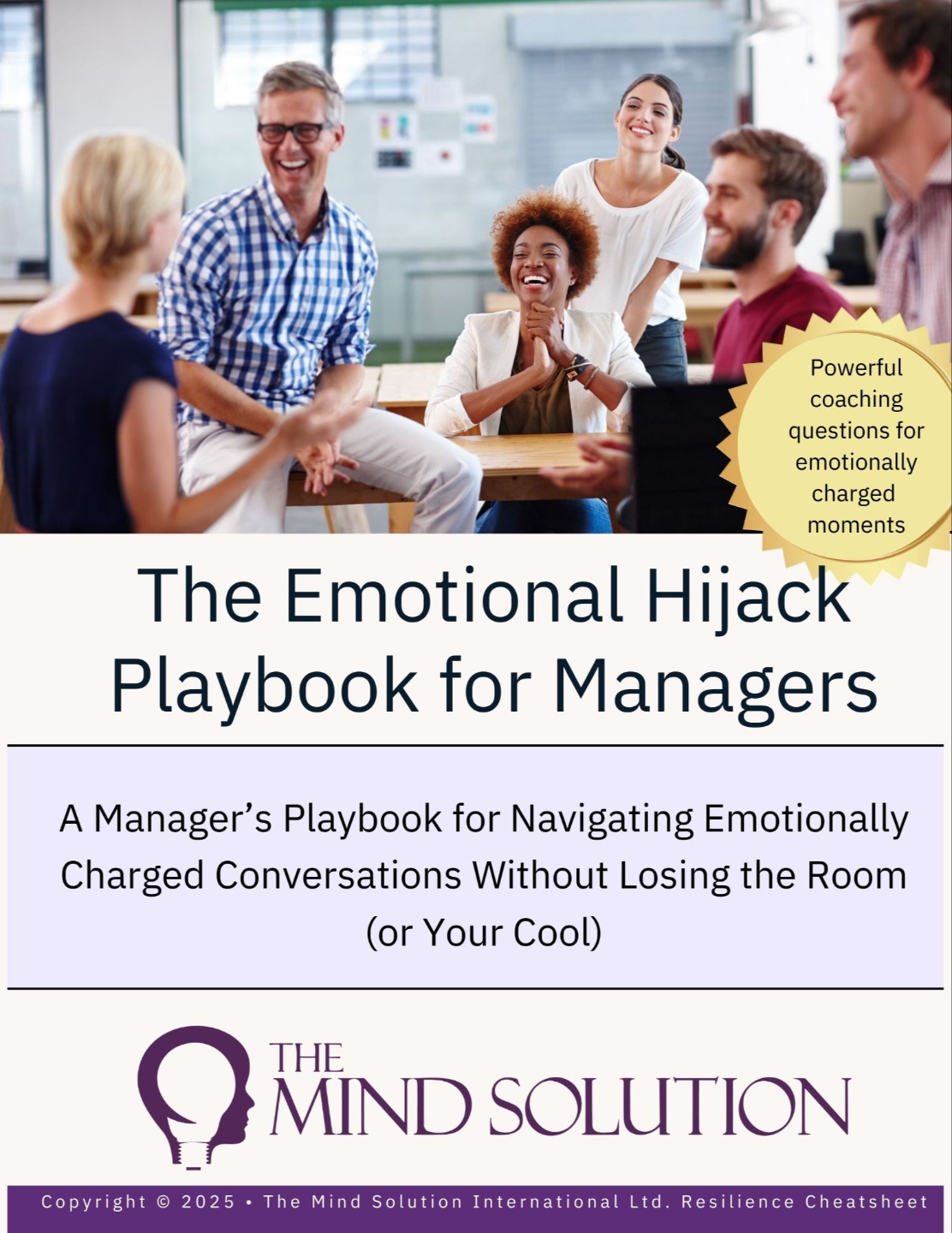HR: This Is the One Area That Needs Your Attention
May 28, 2025The Real Reason for HR Burnout (And It's Probably Not What You Think)
What if everything you've been told about HR burnout is only addressing the symptoms, not the cause?
If you've read the latest HR Mental Wellbeing Report by Towergate, the numbers are confronting:
- 73% of HR professionals report symptoms of low mood and depression
- 75% experience anxiety
- 63% are very likely experiencing burnout
- And 42% are considering leaving the profession altogether
If I were still working in HR today, I'd probably read that and say: Of course we're burning out. Look at what we're dealing with!
I used to love employee relations work, and believe it or not, any kind of change management. Change management was the area I was awarded a First in during my HR degree, so I must have had a taste for it!
But I also recall the emotional weight of watching people be made redundant. Or feeling powerless to do anything other than refer people to an EAP scheme or Occupational Health, all while trying to maintain that professional composure that's expected of us.
The Weight We Carry That No One Sees
I recall working in the NHS as an HR Business Partner, and every month I'd sit in front of a strategy board demanding answers about reducing absence, improving retention and lowering the amount of ER Cases. I was responsible for over 2,000 employees in my division, and I constantly felt like I was fire-fighting while desperately wanting to make an impact.
And I've done it all with a professional smile and what I now understand was a completely overloaded nervous system.
But here's what I didn't understand then—what none of us are taught to understand:
The real problem wasn't the situations themselves. It was how my nervous system had learned to respond to them.
The Awakening That Changed Everything
At the time, I was Head of HR for British Airways Holidays. I had climbed the corporate ladder, earned respect, and built a reputation. I had no plans to leave the profession I genuinely loved.
But I was fascinated by something that kept nagging at me: the human psyche. What makes people tick beneath the surface? Why do we behave the way we do?
That curiosity led me to begin training as a solution-focused psychotherapist and hypnotherapist.
I had no intention of doing what I do now, however, I couldn't ignore that a four-year HR degree or any of the leadership development programmes I'd attended had given me little to no understanding of the human psyche.
And isn't that strange? We deal with human dynamics every single day. We support emotional complexity, mediate conflict, coach behaviour change, design cultures, and shape the very environments where humans spend the majority of their waking hours.
But we were never taught what actually drives human experience at the deepest level.
The Pattern That Changes Everything
About a third of the way through that training, I had a moment of deep clarity that changed the trajectory of my entire life.
I was sitting in a lecture about the neuroscience of stress—learning about fight, flight, freeze responses, about how our subconscious mind processes thousands of pieces of information every second, about how our past experiences create neural pathways that determine our present reactions.
And suddenly, everything clicked.
I realised: This is what's missing in HR. This was the piece of the puzzle no policy, no framework, no leadership competency model could ever fill.
In that moment, I understood why I'd been carrying those difficult conversations in my body for days afterward. Why that email exchange with the Finance Director had lived rent-free in my head for weeks. Why I'd wake up at 3am with my heart racing, replaying scenarios that were supposedly "handled."
It wasn't because I was weak or failing or not cut out for the role.
It was because my nervous system had been conditioned through years of high-stakes situations, perfectionist expectations, and emotional suppression, to perceive every challenge as a threat to my survival.
And in that moment, I made a decision.
Once I qualified, I would leave my corporate HR career—and I would take this knowledge back into the workplace where it was desperately needed.
Call it a calling. A pull. A soul mission.
That was 13 years ago.
What I've Learned from 10,000 Sessions
Since then, I've held around 10,000 one-to-one client sessions. I've had front-row seats to the minds, hearts, and nervous systems of hundreds of people—many of them HR professionals just like you.
And I've learned something that might feel uncomfortable at first, but is absolutely life-changing once you see it:
So much of what we experience as stress, depression, anxiety, and burnout in HR isn't about the job or the culture. It's about our conditioned responses.
Let me explain what I mean.
The Invisible Programming Running Your Experience
Every single day, you're walking into situations that your nervous system is unconsciously evaluating for threat levels. Not just physical threats—emotional, professional, and social threats.
When you're sitting in a meeting where tensions are high, your system is on high alert, scanning for danger, preparing for attack, even while you're nodding and taking notes.
When you're delivering difficult news or having challenging conversations, your body is in a state of hypervigilance that was designed for short bursts of life-or-death situations, not eight hours a day, five days a week, for years on end.
But here's the part that no one talks about: this isn't happening because you're in HR. It's happening because of how your nervous system learned to interpret the world.
Maybe you learned early that love was conditional on being perfect. So now every mistake feels like a threat to your very survival.
Maybe you learned that conflict was dangerous. So now every difficult conversation activates your fight-or-flight response.
Maybe you learned that your worth was measured by pleasing other people. So now saying no feels impossible, even when you're drowning.
These aren't conscious thoughts. They're subconscious programming, running in the background of every interaction, every decision, every moment of your professional life.
Why You're Still Carrying That Meeting
You might think the emotional weight you're feeling is coming from:
- That boardroom clash where you felt undermined and dismissed
- That email that landed badly and now has you questioning every word you write
- That redundancy conversation you didn't ask to lead but had to deliver with compassion
- The toxic culture you're trying to shift from the sidelines while feeling powerless
But here's the thing: If it were just the situation, why does it follow you home?
Why are you still replaying it hours later, days later? Why does it sit in your chest like a stone long after it's supposedly "dealt with"? Why do you wake up at 2am with your mind racing through scenarios that haven't even happened yet?
It's not the situation. It's your nervous system's response to the situation, shaped by:
- Neural pathways carved by past experiences (every time something similar happened before)
- Subconscious beliefs about your worth, safety, and belonging (formed in childhood and reinforced throughout your life)
- Nervous system conditioning (how your body learned to respond to stress, conflict, and uncertainty)
- Inherited trauma patterns (yes, we can inherit nervous system responses from our parents and grandparents)
And that—not the workload, not the difficult people, not even the broken systems—is what's quietly draining you.
The Neuroscience of HR Burnout
Let me get specific about what's happening in your body and brain when you're in chronic work stress:
Your Prefrontal Cortex (Your Wise Mind): This is where your best thinking happens—strategic planning, big picture thinking, creative problem-solving. But when you're in chronic stress, blood flow is redirected away from this area. You literally can't access your full intelligence.
Your Amygdala (Your Alarm System): This becomes hyperactive, constantly scanning for threats. That email notification? Potential threat. That meeting request? Potential threat. That pause in conversation? Definitely a threat.
Your Nervous System: Gets stuck in sympathetic activation (fight/flight) or dorsal shutdown (freeze/collapse). You're either running on stress hormones or feeling completely depleted. There's no in-between.
Your Vagus Nerve: The superhighway of your nervous system becomes dysregulated. You lose access to your natural calm, your intuitive knowing, your authentic presence.
This isn't a character flaw. This is biology.
Watch This: The Insight That Changes Everything
🎥 Watch the video: "HR: This Is the One Area That Needs Your Attention"
In this video, I share the deeper truth about what's really behind the emotional exhaustion that HR professionals are carrying. This isn't a talk about surface-level stress management or another breathing technique to add to your toolkit.
This is a fundamental shift in understanding that changes how you see yourself, your reactions, and your capacity for leadership.
Watch this if you've ever:
- Felt like you're failing, despite doing everything "right"
- Woken up at 2am thinking about work scenarios
- Carried emotional weight that didn't feel like yours to hold
- Tried every wellbeing strategy but still feel depleted
- Wondered why some days you feel like you can handle anything, and other days a simple email sends you into a spiral
- Found yourself snapping at loved ones after a difficult day at work
- Felt imposter syndrome despite years of experience and success
- Struggled to make decisions that used to feel easy
- Lost touch with the passion that originally drew you to HR
What Happens When HR Professionals Understand This
This is what I now teach inside HR Alchemy—my signature emotional intelligence programme for HR teams that prevents HR Burnout.
But this isn't traditional emotional intelligence training or HR Stress Management Training. We don't just talk about managing emotions—we dive into nervous system regulation, unconscious patterning, and the real mechanics of human experience.
We explore:
Nervous System Mastery: How to recognise your activation patterns and return to regulation in real-time, even in high-stakes situations.
Subconscious Reprogramming: How to identify and shift the limiting beliefs that are running your experience beneath conscious awareness.
Somatic Intelligence: How to read the wisdom of your body and use it as a guidance system for decision-making.
Energetic Boundaries: How to distinguish between your emotions and others', and stop absorbing the stress of everyone around you.
Trauma-Informed Leadership: How past experiences shape present reactions, and how to lead from healing rather than wounding.
Co-Regulation Skills: How to use your nervous system to help others find calm and clarity, transforming your presence into a leadership superpower.
And I can say with absolute certainty: You and your team will not leave this programme as the same person.
Because once you understand this lens, you see yourself—and your leadership—in a completely different way.
You stop managing symptoms. You start leading from sovereignty.
Beyond Individual Healing: Systemic Change
But here's what excites me most: when HR professionals do this work, they don't just transform themselves—they transform entire organisations.
Because you become living examples of what's possible. You show up differently in meetings. You have difficult conversations with grace. You make decisions from clarity rather than reactivity. You create psychological safety simply through your presence.
You stop perpetuating the very systems that created the burnout in the first place.
And that's when real change happens—not through policy updates or employee wellbeing programmes, but through embodied transformation of the humans who shape workplace culture.
The Invitation
This is your invitation to step off the hamster wheel of symptom management and into root-cause transformation.
✨ Download the free HR Activation: From Survival to Energetic Sovereignty
Get immediate access to the foundational practices that begin shifting your nervous system from survival mode to thriving mode.
📞 Ready to explore HR Alchemy for your team? Book a connection call
If you're ready to bring this transformation to your entire HR function, let's talk about what's possible when your whole team operates from nervous system regulation and emotional mastery.
The Truth You Need to Hear
HR was never meant to cost you your health. You didn't come into this profession to become the collateral damage of organisational stress. You came here to make a difference, to support human flourishing, to create workplaces where people can thrive.
And it doesn't have to be this way.
You are not broken. You are not failing. And you are not alone.
Your nervous system is doing exactly what it was designed to do—protect you from perceived threats. The problem is that it's using outdated information and responding to modern challenges with ancient programming.
But this—this understanding of what's really happening beneath the surface—this is the one area that needs your attention.
Because when you shift here, everything else begins to change.
Your leadership transforms. Your relationships deepen. Your health improves. Your joy returns.
And you remember why you fell in love with HR in the first place—not because it was easy, but because it mattered.
The question isn't whether you can change this pattern.
The question is: are you ready to?
The Emotional Hijack Playbook For Managers
A Manager’s Free Resource for Navigating Emotionally Charged Conversations Without Losing the Room (or Your Cool).
Perfect to use in your next one-to-one.







